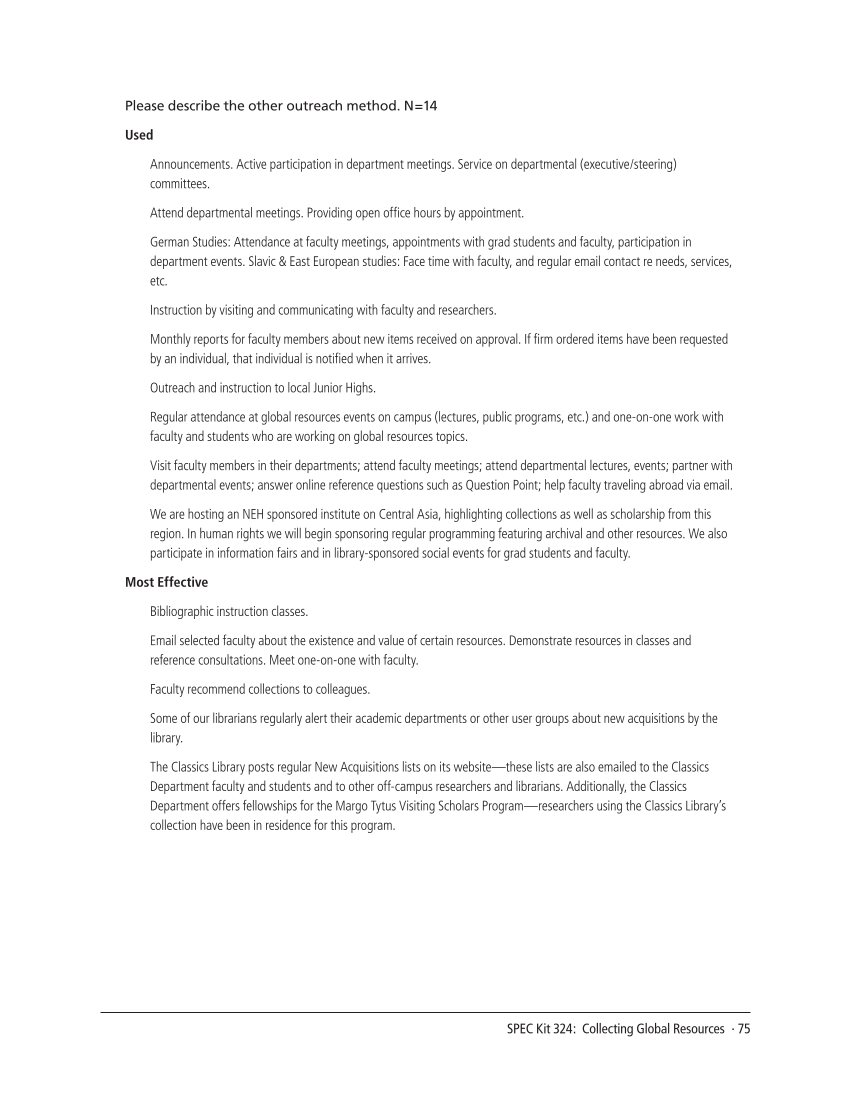SPEC Kit 324: Collecting Global Resources · 75
Please describe the other outreach method. N=14
Used
Announcements. Active participation in department meetings. Service on departmental (executive/steering)
committees.
Attend departmental meetings. Providing open office hours by appointment.
German Studies: Attendance at faculty meetings, appointments with grad students and faculty, participation in
department events. Slavic &East European studies: Face time with faculty, and regular email contact re needs, services,
etc.
Instruction by visiting and communicating with faculty and researchers.
Monthly reports for faculty members about new items received on approval. If firm ordered items have been requested
by an individual, that individual is notified when it arrives.
Outreach and instruction to local Junior Highs.
Regular attendance at global resources events on campus (lectures, public programs, etc.) and one-on-one work with
faculty and students who are working on global resources topics.
Visit faculty members in their departments attend faculty meetings attend departmental lectures, events partner with
departmental events answer online reference questions such as Question Point help faculty traveling abroad via email.
We are hosting an NEH sponsored institute on Central Asia, highlighting collections as well as scholarship from this
region. In human rights we will begin sponsoring regular programming featuring archival and other resources. We also
participate in information fairs and in library-sponsored social events for grad students and faculty.
Most Effective
Bibliographic instruction classes.
Email selected faculty about the existence and value of certain resources. Demonstrate resources in classes and
reference consultations. Meet one-on-one with faculty.
Faculty recommend collections to colleagues.
Some of our librarians regularly alert their academic departments or other user groups about new acquisitions by the
library.
The Classics Library posts regular New Acquisitions lists on its website—these lists are also emailed to the Classics
Department faculty and students and to other off-campus researchers and librarians. Additionally, the Classics
Department offers fellowships for the Margo Tytus Visiting Scholars Program—researchers using the Classics Library’s
collection have been in residence for this program.
Please describe the other outreach method. N=14
Used
Announcements. Active participation in department meetings. Service on departmental (executive/steering)
committees.
Attend departmental meetings. Providing open office hours by appointment.
German Studies: Attendance at faculty meetings, appointments with grad students and faculty, participation in
department events. Slavic &East European studies: Face time with faculty, and regular email contact re needs, services,
etc.
Instruction by visiting and communicating with faculty and researchers.
Monthly reports for faculty members about new items received on approval. If firm ordered items have been requested
by an individual, that individual is notified when it arrives.
Outreach and instruction to local Junior Highs.
Regular attendance at global resources events on campus (lectures, public programs, etc.) and one-on-one work with
faculty and students who are working on global resources topics.
Visit faculty members in their departments attend faculty meetings attend departmental lectures, events partner with
departmental events answer online reference questions such as Question Point help faculty traveling abroad via email.
We are hosting an NEH sponsored institute on Central Asia, highlighting collections as well as scholarship from this
region. In human rights we will begin sponsoring regular programming featuring archival and other resources. We also
participate in information fairs and in library-sponsored social events for grad students and faculty.
Most Effective
Bibliographic instruction classes.
Email selected faculty about the existence and value of certain resources. Demonstrate resources in classes and
reference consultations. Meet one-on-one with faculty.
Faculty recommend collections to colleagues.
Some of our librarians regularly alert their academic departments or other user groups about new acquisitions by the
library.
The Classics Library posts regular New Acquisitions lists on its website—these lists are also emailed to the Classics
Department faculty and students and to other off-campus researchers and librarians. Additionally, the Classics
Department offers fellowships for the Margo Tytus Visiting Scholars Program—researchers using the Classics Library’s
collection have been in residence for this program.




















































































































































































